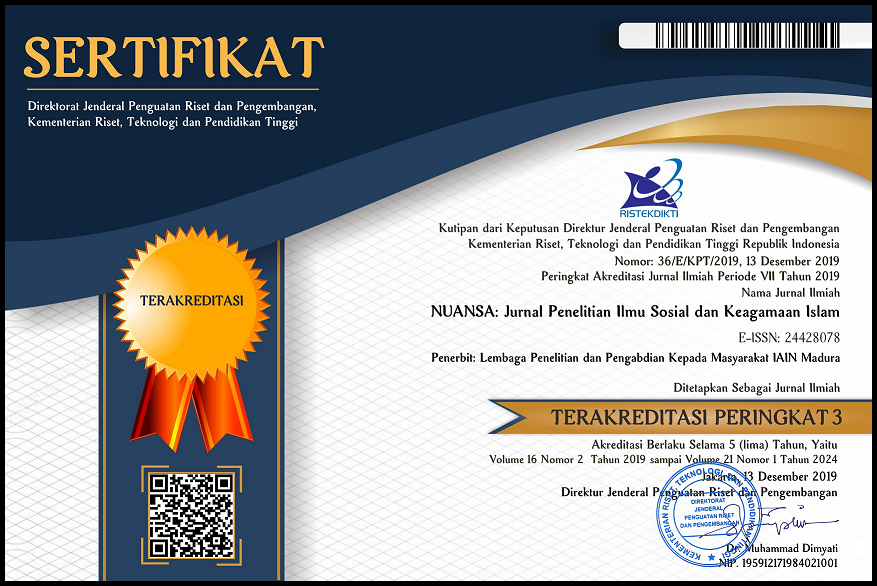PANDANGAN ISLAM TERHADAP ETIKA KECERDASAN BUATAN (ARTIFICIAL INTELLIGENCE) DALAM KEHIDUPAN SEHARI-HARI
 Abstract views: 491
,
Abstract views: 491
,
 PDF downloads: 1056
PDF downloads: 1056
Abstract
The advancement of artificial intelligence (AI) technology has had a significant impact on many parts of daily life, particularly for Muslims. The rise of problems about the ethics of employing AI from an Islamic perspective is worth discussing. This essay will look at Islamic perspectives on AI and how Islamic ethics might help guide the usage of this technology. This study takes a qualitative approach, employing literature study methods and an analysis of Islamic literature on ethics, technology, and artificial intelligence. The conclusion demonstrates that Islam supports the use of technology that benefits humanity while prioritizing ethical concepts such as justice, responsibility, and prudence in coping with the potential negative consequences of AI.
Downloads
References
Alam. “Artificial Intelligence and Justice: A Maqasid al-Shariah Perspective.” Journal of Islamic Ethics 05 No. 01 (2022): 87.
Ali, Mohammad. “Ethics of AI Perspective,.” Journal of Islamic Ethics, 22, 05 (2021): 34–37.
Bakar, O. Islam and Science: Ensuring Ethical Frameworks in Technological Advancements. Kuala Lumpur: IIUM Press, 2021.
J. Creswell, J. “Research Design: Qualitative, Quantitative, and Mixed Methods Approaches,” 40–42. Sage Publications, 2018.
Kamali, dan Mohammad Hashim. Principles of Islamic Jurisprudence. Cambridge: Islamic Texts Society, 2003.
Karim, Z. “Ethical Frameworks in the Application of Artificial Intelligence: An Islamic Approach.” Journal of Islamic Studies and Technology 07, no. 02 (2021): 45–49.
Mawdudi, Abu A’la. The Islamic Way of Life. New Delhi: Markazi Maktaba Islami Publishers, 1999.
Nasr, dan Sayyid Hossein. Science and Civilization in Islam. Cambridge: Harvard University Press, 1968.
Nasr, Seyyed Hossein. Islam and the Psychology of the Human Soul. Cambridge: Harvard University Press, 2021.
Rahman, A. Islam and Technology: Navigating Modern Challenges. Surabaya: Al-Hikmah Press, 2018.
Rahman, F. Etika Islam dalam Dunia Digital: Kecerdasan Buatan dan Tanggung Jawab Manusia. Yogyakarta: UII Press., t.t.
Rahman, Fazlur. Islam and Modernity: Transformation of an Intellectual Tradition. Chicago: University of Chicago Press, 1982.
Risvi. “‘AI in Islamic Ethics,.’” Journal of Islamic Studies 10, no. 3 (2020): 95-110.
Rizvi, S.H. “AI in Islamic Ethics.” Journal of Islamic Studies 10, no. 3 (2020).
Shihab, Q. Wawasan Al-Qur’an tentang Teknologi dan Kehidupan Modern. Jakarta: Lentera Hati., 2019.
Yusuf, M. Fikih dan Teknologi: Pandangan Islam terhadap Inovasi Teknologi Modern. Jakarta: Kencana, 2021.
Zaki, Nabil. “Artificial Intelligence in Islamic Ethics.” Islamic Technology Review 6, no. 1 (2020).
Zubair, A. “Islamic Values in Digital Consumerism: Balancing Faith and Modernity.” Journal of Islamic Economics, 2021.
Copyright (c) 2024 NUANSA: Jurnal Penelitian Ilmu Sosial dan Keagamaan Islam

This work is licensed under a Creative Commons Attribution-NonCommercial 4.0 International License.
The journal operates an Open Access policy under a Creative Commons Attribution-NonCommercial 4.0 International License (CC-BY-NC) 
Authors who publish with this journal agree to the following terms:
- Authors retain copyright and grant the journal right of first publication with the work simultaneously licensed under a Creative Commons Attribution License that allows others to share the work with an acknowledgement of the work's authorship and initial publication in this journal.
- Authors are able to enter into separate, additional contractual arrangements for the non-exclusive distribution of the journal's published version of the work (e.g., post it to an institutional repository or publish it in a book), with an acknowledgement of its initial publication in this journal.
- Authors are permitted and encouraged to post their work online (e.g., in institutional repositories or on their website) prior to and during the submission process, as it can lead to productive exchanges, as well as earlier and greater citation of published work.





















